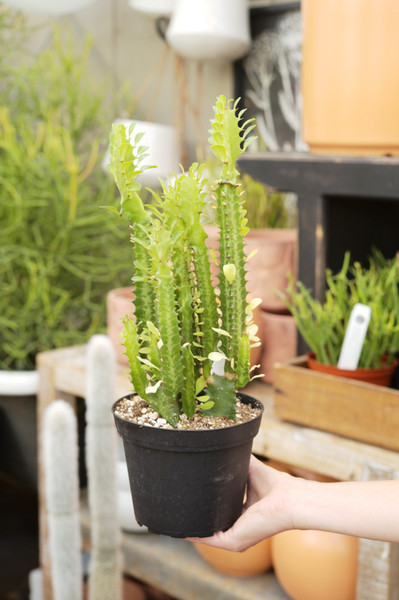Euphorbia trigona
Posted by Hannah Brand on Jul 28th 2024
Weekly Plant Chat: Euphorbia trigona
Hey Plant Friends!
This week we are going to be talking about Euphorbia trigona, more commonly known as the African Milk Tree. This plant’s common name comes from the white milky sap contained inside. This Euphorbia is known for its characteristic stacking cathedral like growth and beautiful red or green color. At Tonkadale we often carry either the red or green version of Euphorbia trigona.
Family of Origin
Euphorbia trigona belongs to the Euphorbiaceae or Spruge plan family along with Poinsettias, cassava, and pencil cactus and is native to Central Africa. Although it looks like a cactus, its care is closer to that of a succulent.
Plant Care
Light
Euphorbia need bright light for optimal growth and plant health. Place in a sunny, south facing window for best results and to avoid any etiolation (long, pale and unhealthy growth due to the lack of light). Euphorbia do tolerate a bit less light than cactus which make them a bit more adaptable as an indoor plant. If you would like to grow your plant outdoors in the summer, be sure to harden them off slowly before exposure to full sun.
Soil
When it's time to repot, use a sharp, well-draining potting soil. We recommend Sol Soils Cactus Gritty Mix. This mix has a unique combination of coconut husk chips, recycled forest products, pumice, calcined clay, granite, and expanded clay for optimal drainage.
Water
Allow soil to completly dry down before giving a good soak. Hydration events may only occur once per month! Cut back on water during the winter months as light levels decrease.
Fertilizer
Fertilize with a cactus specific fertilizer (although not a cactus). We recommend Schultz Liquid Cactus Plant Food. As grow slows in the winter months, fertilization may not be needed.
Hot Tips
Euphorbia trigona have a naturally shallow root system so offering support like a bamboo stake is a great idea.
Keep an eye out for common pests such as mealy bugs and scale. Check for pests weekly while watering and keep a bottle of Bonide’s Insecticidal Soap on hand for easy treatment.
Cactus are toxic to cats and dogs. Euphorbia stems are filled with a latex sap that can be irritating and harmful when contact is made. Take caution with young children and pets.
Shop Now!
Always approachable and happy to help!

